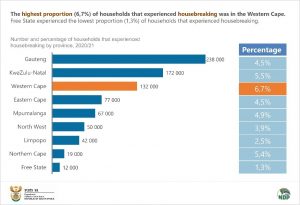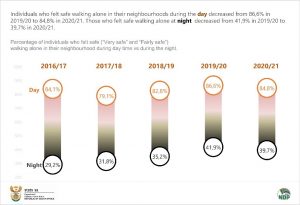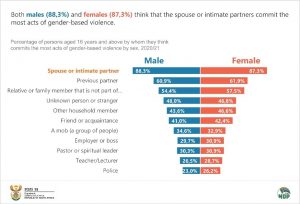Experience of crime in SA dropped over 2020/21 period
Experience of crime in SA dropped over 2020/21 period
According to the Governance, Public Safety, and Justice Survey, 2020/21 (GPSJS) released by Statistics South Africa, levels of crime experienced by households and individuals in SA over the 2020/21 period has dropped.
Due to the COVID-19 pandemic, South Africa implemented strict measures, with multi-level lockdowns, curfews, the ban on travel, and restrictions on alcohol and cigarettes. The survey, which covers the period of the pandemic (01 April 2020 to 31 March 2021) shows that while an upward trend was observed between 2016/17 and 2019/20 for experience of housebreaking, theft of motor vehicle and murder, there was a decline in the experience of these three types of crime between 2019/20 and 2020/21.
Home robbery has been declining since 2016/17. In 2020/21 the household experience of home robbery declined by 25% from the previous year. An estimated 141 000 incidences of home robberies occurred, affecting 112 000 or 0,6% of all households in 2020/21. About 56% of households that experienced home robbery reported it to the police.
While housebreaking is the most common crime experienced by households in the country, the number of households that experienced housebreaking was down by 17 percent in 2020/21 from the previous year. An estimated 1,0 million incidences of housebreaking occurred, affecting 809 000 households in South Africa. The number of affected households represents 4,6% of all households in the country. Almost 56% of households that experienced housebreaking reported it to the police. The province with highest proportion of households that experienced housebreaking was the Western Cape (6,7%).
The latest report on crime issued by Stats SA covers a range of crimes experienced by South African citizens. Let us look at some of the key findings of this report.
Theft of a motor vehicle
There was an estimated 83 000 incidences of theft of motor vehicles in 2020/21, affecting 81 000 households. The number of affected households represents 0,5% of all households in the country. About 91,0% of households that experienced theft of motor vehicles reported the crime to the police.
Murder
An estimated 11 000 incidences of murder occurred in 2020/21 affecting 11 000 households. The number of households represents 0,1% of the households in South Africa and is down 19% from 2019/20.
Theft of personal property
An estimated 844 000 incidences of theft of personal property occurred in 2020/21, affecting 732 000 individuals aged 16 years and older. The number of affected individuals represents 1,8% of the population. About 30,5% of individuals who experienced theft of personal property reported all or some incidences to the police.
Street robbery
An estimated 346 000 incidences of street robbery occurred in 2020/21, affecting 304 000 individuals aged 16 years and older. The number of affected individuals represents 0,7% of the population. About 54,9% of individuals who experienced theft of personal property reported all or some incidences to the police.
Hijacking of motor vehicles
An estimated 64 000 incidences of hijackings occurred in 2020/21, affecting 64 000 individuals aged 16 years and older. The number of affected individuals represents 0,2% of the population.
Feelings of safety
About 85% of adults aged 16 years and older felt safe walking alone in their neighbourhood during the day, while about 40% felt safe walking alone in their neighbourhood during the night. A larger proportion of females felt unsafe walking alone at night in their neighbourhoods compared to males, while rural residents had a greater feeling of safety walking alone in their areas when it is dark than residents in urban areas.
General individual perception
While lockdown restrictions attempted to control the spread of COVID-19 by keeping people at home, this may have increased the chance for domestic and family violence to occur. According to UN Women1, “Since the outbreak of COVID-19, emerging reports have shown that several types of violence against women and girls have intensified”. According to GPSJS 2020/21 report, there has been a decrease in the proportions of those who believe that it is justifiable for a man to beat his woman/wife. Both males (88,3%) and females (87,3%) think that the spouse or intimate partner commit the most acts of gender-based violence. This is followed by those who think a previous partner, relative or family member that is not part of the household commits the most acts of gender-based violence. About 99% of persons aged 16 years and older agreed/strongly agreed that all kinds of violence against women and children must be reported.
For more information, download the full report here.
1https://africa.unwomen.org/en/digital-library/publications/2020/12/gbv-in-africa-during-covid-19-pandemic




